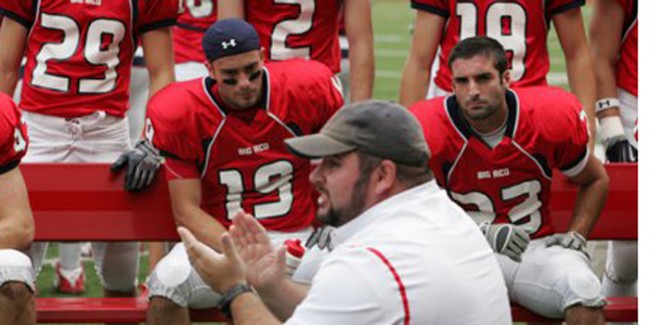
Joe Ehrmann was the Keynote speaker at the 2014 NSCA Coaches Conference and really connected with the audience. Coaches often seek presenters that can relate to their situation and help them grow as people. Joe Ehrmann delivers a thoughtful and honest message for people in a mentoring role. The simple message that coaches can gravitate toward, grab onto, and use in their own development along with their athlete's development?
Transactional Coaches vs. Transformational Coaches
Ehrmann is the author of the InSideOut Coaching: How Sports Can Transform Lives. I have read this book and I was definitely captivated by Ehrmann's writing. Ehrmann's ability to self-reflect with unaologetic honestly was refreshing and impactful. The basic concept is one that all strength & conditioning coaches can (and should) relate to.
Ehrmann has separated coaching into two categories. Transactional and Transformational.
In his own words, Ehrmann describes Transactional coaches as "...[coaches who] look for what they can get out of coaching and not what they can give. They ignore athletes developmental needs and often manipulate and distort the values of wining and losing."
On the contrary, transformational coaches use sports to mentor and improve young peoples lives and assist them in becoming a productive member of society. Sports are a microcosm of life and coaching may be the best opportunity to help young athletes become better people, above all else.
Erhmann explains, "Outside parenting, there might not be a better platform than coaching to transform boys and girls into healthy and thriving men and women. A coach's responsibilities include helping young people to confront and comprehend the toxic culture that is trying to seduce and shape them."
It is refreshing to see many of my colleagues who have used these terms to self-evaluate and mentor their staffs. I have gained the uncanny ability to tell whether a coach is coaching for themselves or coaching to help others in about 30 seconds. You can identify these individuals as the coaches trying to prove their worth with every statement as opposed to praising the worth of every athlete. Here is a list I have compiled to better define transactional and transformational coaches in (mostly) my own words.
Transactional Coaches...
- are worried about the logo on their polo
- love making YouTube videos showing their athletes to make themselvs look better
- love being part of the action and being noticed
- loves record boards and publicizing PRs
- write articles to impress fellow coaches
- have a tally of how many DI prospects they train
- use the accomplishments of athletes for their own recognition
Transformational Coaches
- teach athletes the value of hard work
- care about their athletes and are not afraid to show it
- mentor young men and women on how to deal with life issues through athletics
- connect with athletes on a personal level and value each of them
- reward athletes that display high character qualities
- promote leadership potential and encourage athletes making the difficult, but right decisions
- take time to talk about "the why"
This list is far from inclusive or complete. These are my thoughts, not the authors. That being said, we can all relate to these qualities and understand the bottom line and the most important question we all must ask ourselves....
Why are you a coach?
My college coaching days are long gone and I haven't trained anyone in over a year. My coaching duties are regulated to 6-7 year old girls soccer and I have no idea what our record was last year. My goals for our team?
- Have so much fun playing soccer you can't wait for practice
- Make meaningful friendships based on trust and compassion
- Learn the game of soccer along with how and why you can be good at it
- Play again next year
I am extremely lucky to be a dad to three wonderful daughters. That to me is my most important "coaching role." I am fortunate to be a teacher while still having the opportunity that Dave has given me to continue to write. I am fortunate to stay connected with coaches and have made a commitment to share my experiences and mistakes along the way.
I will always be proud of the fact that even though I am not a college coach anymore, there are a group of young men and women that number in the thousands that still to this day call me "coach". Even the ones early in my career when I was more transactional than what I became later on. Without a doubt, I became a better coach when...
- I realized I didn't know everything
- I realized it wasn't about me
- I realized the best job I could possibly have is the one I had
This transition happened over time and was probably not just me getting older. It way due to the coaches I worked with and the athletes I coached. I only hope my faith, my wife, my little girls, my students, and my little soccer players will get the best of me every opportunity I have. That is the challenge we all have as "coaches."
Articles by Mark Watts
Olympic Lifting for Athletes: Using Static Holds to Improve Technique
Head Games: Training the Neck to Reduce Concussions
The Fastest Sport on Ice: Things You Don't Know About Bobsled
Tips to Crush the Combine Tests
An In-Season Training Guide for Baseball Pitchers
Individual Training in a Team Setting
Off-Season Training for Football (with 8-Week Program)
What is Really Wrong with Strength and Conditioning
The Last Sports Performance Podcast
Olympic Lifting for Athletic Performance
Sports Performance Coach Education Series
WATCH: How to Find a Strength and Conditioning Job
WATCH: Becoming a Mentor to Young Coaches
WATCH: The Four-Step Coaching Process
WATCH: 5 Strategies to Perform More Work in Less Time
WATCH: Why Communication is Key to a Better Coaching Career
WATCH: A Better Way to Train High School Athletes
WATCH: How to Implement Auto-Regulatory Training in a Team Setting
WATCH: Pre-Workout Circuits to Optimize Training Time and Maximize Performance
WATCH: Hypertrophy Circuits for Athletes in a Team Setting
Coaches Clinics
WATCH: Two Bench Press Mechanical Drop-Sets for Hypertrophy
WATCH: Two Lateral Speed Drills with Bands to Improve Change of Direction
WATCH: Adjusting the Glute-Ham Raise to Optimize Your Training
WATCH: Basic Linear Speed Acceleration Drills in a Team Setting
WATCH: Kettlebell Training for Team Sports















Thank you for all you do and publish. Your information and articles have helped me tremendously as a young assistant collegiate strength coach. Keep up the good work.